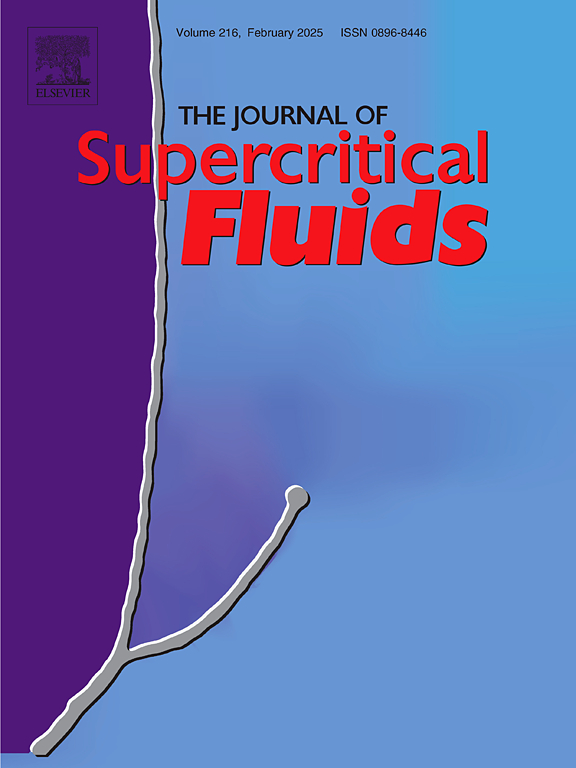Effect of supercritical CO2 drying variables and gel composition on the textural properties of cellulose aerogels
IF 3.4
3区 工程技术
Q2 CHEMISTRY, PHYSICAL
引用次数: 0
Abstract
Cellulose aerogels are interesting platforms for biomedical and drug delivery applications, due to their biocompatibility, biodegradability, water absorption capacity, and good textural properties. Supercritical CO2 drying has been proven as an efficient technology for obtaining aerogels and preserving the porous structure. In this work, the effect of relevant process variables (CO2 density, depressurization rate, and intermediate depressurization mode) and gel composition on the textural properties of cellulose aerogels is studied. Experiments are performed in batch-mode, and aerogel monoliths are characterized in terms of apparent density, porosity, specific surface area, and crystalline morphology. Water uptake in different buffer solutions is also evaluated. The use of thiourea in the gel formation leads to lower porosity. On the other hand, higher porosity and surface area are obtained when depressurization is slow and the system is only partially depressurized between drying cycles. Aerogels showed a good and fast water uptake capacity, regardless of the pH (200–500 %).
超临界二氧化碳干燥变量和凝胶成分对纤维素气凝胶纹理特性的影响
纤维素气凝胶具有生物相容性、生物可降解性、吸水能力和良好的质地特性,是生物医学和药物输送应用的有趣平台。超临界二氧化碳干燥已被证明是获得气凝胶并保持其多孔结构的有效技术。在这项工作中,研究了相关工艺变量(二氧化碳密度、减压速率和中间减压模式)和凝胶成分对纤维素气凝胶质构特性的影响。实验以间歇模式进行,气凝胶单体在表观密度、孔隙率、比表面积和结晶形态方面均有特征。此外,还评估了气凝胶在不同缓冲溶液中的吸水性。在凝胶形成过程中使用硫脲会导致孔隙率降低。另一方面,如果减压速度较慢,且系统在两次干燥循环之间只进行部分减压,则孔隙率和比表面积会更高。无论酸碱度如何(200-500 %),气凝胶都具有良好而快速的吸水能力。
本文章由计算机程序翻译,如有差异,请以英文原文为准。
求助全文
约1分钟内获得全文
求助全文
来源期刊

Journal of Supercritical Fluids
工程技术-工程:化工
CiteScore
7.60
自引率
10.30%
发文量
236
审稿时长
56 days
期刊介绍:
The Journal of Supercritical Fluids is an international journal devoted to the fundamental and applied aspects of supercritical fluids and processes. Its aim is to provide a focused platform for academic and industrial researchers to report their findings and to have ready access to the advances in this rapidly growing field. Its coverage is multidisciplinary and includes both basic and applied topics.
Thermodynamics and phase equilibria, reaction kinetics and rate processes, thermal and transport properties, and all topics related to processing such as separations (extraction, fractionation, purification, chromatography) nucleation and impregnation are within the scope. Accounts of specific engineering applications such as those encountered in food, fuel, natural products, minerals, pharmaceuticals and polymer industries are included. Topics related to high pressure equipment design, analytical techniques, sensors, and process control methodologies are also within the scope of the journal.
 求助内容:
求助内容: 应助结果提醒方式:
应助结果提醒方式:


